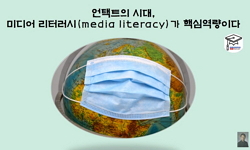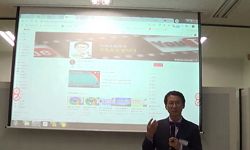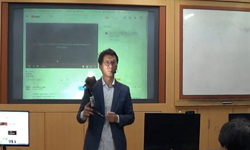The relationship between orality and literacy has long been a topic ofdiscussion in the West, but the modern examination of this relationship couldbe said to have begun in the 1960s. This paper examined some of therepresentative theories from British,...
http://chineseinput.net/에서 pinyin(병음)방식으로 중국어를 변환할 수 있습니다.
변환된 중국어를 복사하여 사용하시면 됩니다.
- 中文 을 입력하시려면 zhongwen을 입력하시고 space를누르시면됩니다.
- 北京 을 입력하시려면 beijing을 입력하시고 space를 누르시면 됩니다.

구술성과 기록성의 관계에 대한 영어권 학자들의 초기 탐구에 대한 소고 = Early Research by English-Speaking Scholars on the Relationship Between Orality and Literacy
한글로보기https://www.riss.kr/link?id=A104895063
-
저자
La Shure Charles (서울대학교)
- 발행기관
- 학술지명
- 권호사항
-
발행연도
2014
-
작성언어
Korean
-
주제어
orality ; literacy ; oral-formulaic theory ; media ; technological determinism ; 구술성 ; 기록성 ; 구전정형어구이론 ; 매체 ; 기술적 결정주의
-
등재정보
KCI등재
-
자료형태
학술저널
-
수록면
29-63(35쪽)
-
KCI 피인용횟수
11
- 제공처
-
0
상세조회 -
0
다운로드
부가정보
다국어 초록 (Multilingual Abstract)
The relationship between orality and literacy has long been a topic ofdiscussion in the West, but the modern examination of this relationship couldbe said to have begun in the 1960s. This paper examined some of therepresentative theories from British, Canadian, and American pioneers in thefield, in the hope of leading to a better understanding of these theories.
1960 was a watershed year in the study of orality and literacy, as this wasthe year when Albert Lord published his The Singer of Tales. Carrying onthe academic tradition of Milman Parry, this study of Slavic oral epics and theirsingers gave the academic world the oral-formulaic theory. The paper nextexamined the research of the Canadian communication theorist MarshalMcLuhan, the American communication theorist and Jesuit priest Walter Ong,the British classicist Eric Havelock, the British social anthropologist JackGoody, and the British social anthropologist Ruth Finnegan.
McLuhan argued that the transition from orality to literacy led to a changein the "ratio of the senses," from the auditory to the visual, and that this changealso led to drastic changes in humanity's way of thinking. He also claimedthat the evolution of media was not a smooth one but one in which newmedia obliterate old media; this idea of a "break" was one that characterized McLuhan's theories. Ong also believed that the evolution of media led tochanges in the way of thinking, but this evolution was not one of a "break"between the old and new so much as it was one in which the new reinforcesthe old. However, a look at his actual arguments shows that he felt it wasonly natural the old media should disappear to make way for the new media. His theories on "primary orality" (orality as it exists in cultures that have neverbeen exposed to written language) and "secondary orality" (orality as it existsin cultures that have been exposed to written language) were particularinfluential to future generations of scholars.
Havelock, on the other hand, argued that at the time of Plato's writing ofThe Republic―centuries after the introduction of the alphabet―orality wasstill the dominant mode, and he opened up the possibility of coexistencebetween orality and literacy. Like McLuhan and Ong, he also believed thatchanges in media were related to changes in ways of thinking, but he insistedthat this process took quite some time. For his part, Goody showed howorality is characterized by the preservation of social traditions through memoryand forgetfulness, while literacy is characterized by an historical consciousnessbased on an objective outlook on life, but he also argued that orality continuedto exist in literate societies. If there was a change to be seen in media, hebelieved (unlike McLuhan) that this change was a natural and organic one. Finnegan also denied what she termed "The Great Divide," and argued thatorality and literacy existed on a continuum. She also rejected the strong versionof technological determinism, which held that media alone were the catalystsof changes in human ways of thinking.
국문 초록 (Abstract)
서양 학계에서는 구술성과 기록성의 관계에 대해서 오랜 세월동안 논의되어 왔으나 현대 논의는 1960년대에 시작됐다고 볼 수 있다. 본 연구는 초기 미국․캐나다․영국 학자들의대표적인 ...
서양 학계에서는 구술성과 기록성의 관계에 대해서 오랜 세월동안 논의되어 왔으나 현대 논의는 1960년대에 시작됐다고 볼 수 있다. 본 연구는 초기 미국․캐나다․영국 학자들의대표적인 이론을 정리하여 이 분야에 기본이 되는 서양 이론을 이해하는 데에 도움이 되고자 한다.
구술성과 기록성의 관계에 대한 현대 연구의 출발점을 설정하자면 로드의 The Singerof Tales가 출판된 1960년이라고 할 수 있는데 그는 밀만 패리의 연구에 이어 슬라브 구비서사시를 연구하였으며 후대 학자들에게 영감을 주는 구전 정형어구 이론을 펼쳤다. 이어서 많은 학자들이 구술성과 기록성에 대해 논했는데 본고에서는 캐나다 정보이론학자였던맥루한, 미국 정보이론학자이자 예수회 신부였던 옹, 영국 구전학자였던 하베록, 영국 사회인류학자인 구디, 영국 사회인류학자인 피네간의 이론을 검토하였다.
맥루한은 구술성에서 기록성으로 넘어가는 과정에서 인간의 감각을 사용하는 비율이 청각 위주에서 시각 위주로 변하였고 이 변화는 또한 인간의 사고방식에도 극단적인 변화를가져왔다고 했다. 그리고 맥루한의 이론의 특징 중에 하나는 ‘끊김’이라고 할 수 있는데, 매체의 진화가 부드럽게 이루어진 것이 아니라 새로운 매체가 이전의 매체를 몰살한다는 주장이다. 옹도 매체의 진화가 사고방식에 변화를 가져온다고 믿었지만 그 진화는 ‘끊김’의 관계라기 보다 새로운 매체가 이전의 매체를 ‘보강’하는 것이라 주장했는데, 실제 논의에서는이전의 매체가 살아남지 않고 사라지는 것이 당연하다고 했다. 그가 특히 후대 학자들에게영향을 미친 개념은 문자가 없는 사회의 ‘일차적 구술성’과 문자가 있는 사회의 '이차적 구술성'이다.
반면 하베록은 알파벳이 도입된 지 수 백 년 후인 플라톤의 <공화국>이 저술된 시기에아직 구술성이 지배적이었다고 주장함으로써 구술성과 기록성의 공존의 가능성을 열어주었다. 맥루한이나 옹처럼 매체의 변화가 사고방식의 변화와 연결된다고 생각했지만 그 과정이 오래 걸린다고 주장했다. 한편, 구디는 구술성이 기억과 망각으로 사회 전통을 지켰다면서 기록성은 객관성으로 인한 역사의식으로 특징지어지지만 기록적 사회에서 구술성이 지속될 수 있다고 주장했다. 매체로 인한 변화가 있다면 맥루한의 주장과 달리 그것이 자연스럽고 유기적인 것이라고 했다. 피네간도 이른바 ‘대경계론’을 부정하여 구술성과 기록성이연속체와 같다고 주장했으며 특히 인간의 사고방식 변화의 촉매가 매체라고 하는 강한 결정주의를 거부했다.
참고문헌 (Reference)
1 McLuhan, Marshall, "Understanding Media: The Extensions of Man" McGraw-Hill 1-318, 1964
2 Lord, Albert B., "The Singer of Tales 2nd edition. ed. Stephen Mitchell & Gregory Nagy" Harvard University Press 1-307, 2000
3 Ong, Walter J., "The Presence of the Word: Some Prolegomena for Cultural and Religious History" University of Minnesota Press 1-378, 1967
4 Havelock, Eric A., "The Muse Learns to Write: Reflections on Orality and Literacy from Antiquity to the Present" Yale University Press 1-144, 1986
5 Goody, Jack, "The Interface Between the Written and the Oral" Cambridge University Press 1-328, 1987
6 McLuhan, Marshall, "The Gutenberg Galaxy: the Making of Typographic Man" University of Toronto Press 1-293, 1962
7 Goody, Jack, "The Consequences of Literacy" 5 (5): 304-345, 1963
8 Havelock, Eric A., "Preface to Plato" Harvard University Press 1-328, 1963
9 Ong, Walter J., "Orality & Literacy: the Technologizing of the Word" Routledge 1-201, 1982
10 Finnegan, Ruth, "Oral Poetry: Its Nature, significance, and social context" Indiana University Press 1-299, 1992
1 McLuhan, Marshall, "Understanding Media: The Extensions of Man" McGraw-Hill 1-318, 1964
2 Lord, Albert B., "The Singer of Tales 2nd edition. ed. Stephen Mitchell & Gregory Nagy" Harvard University Press 1-307, 2000
3 Ong, Walter J., "The Presence of the Word: Some Prolegomena for Cultural and Religious History" University of Minnesota Press 1-378, 1967
4 Havelock, Eric A., "The Muse Learns to Write: Reflections on Orality and Literacy from Antiquity to the Present" Yale University Press 1-144, 1986
5 Goody, Jack, "The Interface Between the Written and the Oral" Cambridge University Press 1-328, 1987
6 McLuhan, Marshall, "The Gutenberg Galaxy: the Making of Typographic Man" University of Toronto Press 1-293, 1962
7 Goody, Jack, "The Consequences of Literacy" 5 (5): 304-345, 1963
8 Havelock, Eric A., "Preface to Plato" Harvard University Press 1-328, 1963
9 Ong, Walter J., "Orality & Literacy: the Technologizing of the Word" Routledge 1-201, 1982
10 Finnegan, Ruth, "Oral Poetry: Its Nature, significance, and social context" Indiana University Press 1-299, 1992
11 Goody, Jack, "Literacy in Traditional Societies" Cambridge University Press 1968
12 Finnegan, Ruth, "Literacy and Orality: Studies in the technology of communication" Blackwell 1988
13 Ong, Walter J., "Interfaces of the Word: Studies in the Evolution of Consciousness and Culture" Cornell University Press 1-352, 1977
동일학술지(권/호) 다른 논문
-
- 한국구비문학회
- 박관수
- 2014
- KCI등재
-
- 한국구비문학회
- 박연숙
- 2014
- KCI등재
-
- 한국구비문학회
- 윤동환
- 2014
- KCI등재
-
- 한국구비문학회
- 송효섭
- 2014
- KCI등재
분석정보
인용정보 인용지수 설명보기
학술지 이력
| 연월일 | 이력구분 | 이력상세 | 등재구분 |
|---|---|---|---|
| 2027 | 평가예정 | 재인증평가 신청대상 (재인증) | |
| 2021-01-01 | 평가 | 등재학술지 유지 (재인증) |  |
| 2018-01-01 | 평가 | 등재학술지 유지 (등재유지) |  |
| 2015-01-01 | 평가 | 등재학술지 유지 (등재유지) |  |
| 2011-01-01 | 평가 | 등재학술지 유지 (등재유지) |  |
| 2009-01-01 | 평가 | 등재학술지 유지 (등재유지) |  |
| 2007-01-01 | 평가 | 등재학술지 유지 (등재유지) |  |
| 2004-01-01 | 평가 | 등재학술지 선정 (등재후보2차) |  |
| 2003-01-01 | 평가 | 등재후보 1차 PASS (등재후보1차) |  |
| 2002-01-01 | 평가 | 등재후보학술지 유지 (등재후보1차) |  |
| 1999-07-01 | 평가 | 등재후보학술지 선정 (신규평가) |  |
학술지 인용정보
| 기준연도 | WOS-KCI 통합IF(2년) | KCIF(2년) | KCIF(3년) |
|---|---|---|---|
| 2016 | 0.73 | 0.73 | 0.78 |
| KCIF(4년) | KCIF(5년) | 중심성지수(3년) | 즉시성지수 |
| 0.72 | 0.64 | 1.574 | 0.06 |




 KCI
KCI






